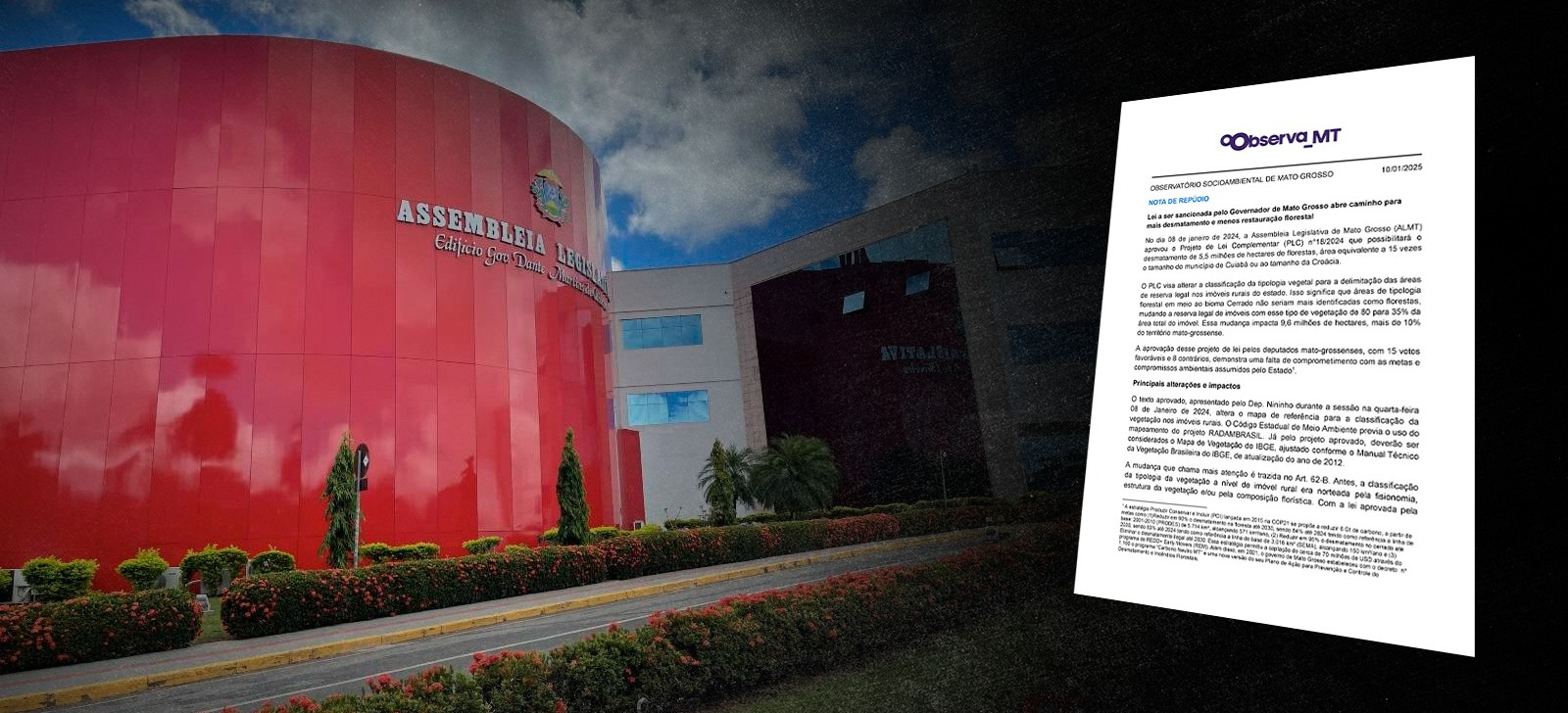Organization points out setback in law that reduces biome areas in Brazil
14 de January de 2025

By Ana Cláudia Leocádio – From Cenarium
BRASÍLIA (DF) – The Socioenvironmental Observatory of Mato Grosso (Observa-MT) released a statement of repudiation last Friday, the 10th, criticising the approval of Complementary Bill 18/2024 as a significant setback in the fight against deforestation. The bill was passed by the Legislative Assembly of Mato Grosso (AL-MT) on anuary 8th. The proposal reclassifies areas composed of Amazon biomes as Cerrado, reducing the mandatory legal reserve area for rural producers from 80% to 35%.
The final text, approved by 15 votes in favour and eight against, is a substitute for the original bill submitted by the Mato Grosso government in May 2024. The new text was introduced by state deputy Nininho (PSD).
For Observa-MT, beyond being a setback, if the bill is sanctioned by Governor Mauro Mendes (União), it will represent the “dismantling of national instruments, the Legal Reserve and the Forest Code, further exacerbating climate change.“
The bill amends provisions of Complementary Law No. 38, of November 21st 1995, which established Mato Grosso’s Environmental Code. Beyond altering an already consolidated article, the new text introduces others, including one that eliminates the detailed analysis of phytophysiognomy, which was previously used as a technical criterion.
The organisation states that changing the classification of Amazon biomes to Cerrado “will allow the deforestation of 5.5 million hectares of forests, an area equivalent to 15 times the size of the municipality of Cuiabá or the size of Croatia.” In total, the change will affect 9.6 million hectares, corresponding to over 10% of Mato Grosso’s territory.

The estimated additional deforestation of forest formations in the Amazon biome under the new bill is 3,758,739 hectares, while for the Cerrado, it would reach 1,795,090 hectares, according to the document.
Beyond the alteration of reference maps for the proposed reclassification, Observa-MT draws attention to Article 62-B, which proposes using “only the concept of biome, associated with an exclusive criterion: tree height, to determine whether the vegetation in the area is forest or Cerrado.”
“It is worth noting that, in Technical Note 2, the IBGE responded to the AL-MT’s inquiry about the bill, stating that the text does not align with the IBGE’s Map/Manual referenced. The Mato Grosso State Secretariat of Environment (Sema-MT) also expressed opposition to the approved text”, the organisation stated.
Another aspect highlighted in the bill relates to the different phytophysiognomies of the Cerrado biome. “Although the Cerrado is predominantly a savanna, it includes phytophysiognomies that can be classified as ‘forests.’ Ignoring the existence of this type of vegetation in public policies compromises the conservation of areas of significant ecological relevance”, the statement stressed.

If the proposal becomes law, its provisions are expected to alter the protection of other types of vegetation formations beyond the biome boundaries. “Forest areas within the Cerrado biome, currently protected by stricter regulations due to their ecological characteristics, will become more vulnerable (around 4 million hectares)”, the organisation warned.
For Observa-MT, one of the most critical impacts is on forest and transition formations, known as ecotones, within the Amazon biome boundaries. “The definition of what constitutes a forest within the biome, based solely on tree height, is questionable as it disregards other relevant metrics (e.g., vegetation density and canopy structure) associated with the IBGE definition, and neglects the diversity of forests within the Amazon region itself”, the statement explained.
“This dismantling takes place in the context of a worsening climate crisis. In 2023, Mato Grosso was the second-largest emitter of greenhouse gases in Brazil, responsible for 11.4% of the country’s total emissions”, the organisation concluded, urging the governor to veto the bill.

In a statement sent to CENARIUM, the Mato Grosso Secretariat of Communication clarified that “the approved proposal bears no resemblance to what was submitted by the Executive. Upon its return, it will be subject to technical and legal review.“
Approved in the first round, the proposal is expected to go through a second vote next week.
Proponent defends proposal
In his justification, Deputy Nininho stated that his substitute text seeks to align Complementary Bill 18/2024 with the Supreme Federal Court’s (STF) decision in the judgement of Direct Actions of Constitutionality (ADC) and Unconstitutionality (ADIs) regarding provisions of the Brazilian Forest Code. As such, the new classification of biomes will be based on the 2012 edition of the Technical Manual on Vegetation by the Brazilian Institute of Geography and Statistics (IBGE).
Additionally, under the new text, property owners will find it easier to compensate for legal reserve requirements, being allowed to acquire surplus areas from other properties to regularise the status. They may also request a review of previously denied opinions under the previous rule, based on the new criteria established by the law.
“Complementary Bill 18/2024 now considers the three biomes that describe the totality of Brazil’s vegetation classification, eliminating the concepts of ‘Transition,’ ‘Phytophysiognomy,’ or ‘species range and occurrence,’” the deputy stated. The parliamentarian also defended the proposed adjustments, claiming they aim to create more efficient arrangements for the state’s sustainable development.

